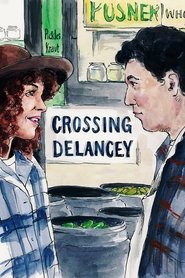Perhaps this is what happens when the archtypes of Girlfriends (1978) are forced to 'grow up' in the Reagan 80s? Now, I loved the unsentimental montages of everyday residents of New York, especially the shots including those who are denied cinematic representation due to not adhering to conventional beauty standards. Adjacent to this is the scene when Isabelle's friend is breastfeeding right in front of her and the camera, which the film treats as entirely unremarkable. No doubt this was somewhat transgressive in a major feature film at the time.
Yet the film's explicit politics shade into outright didacticism at times, especially in the scenes with her grandmother, who is (or appears to be) setting her up with various bachelors around the city with the help of a semi-vaudeville yenta. Oy vey. Indeed, the film is firmly resolved to treat old age as an implicit site of comedy, spectacle and, in the case of the matchmaker, the grotesque. More fundamentally, though, the film seems to bathe in its right-on politics for its day, but, in the words of Hannah McGill, "When a woman succeeds within a capitalist patriarchy, has a feminist or an anti-feminist thing occurred?" The film hardly helps itself in its choice of genre: as any scholar of Pride and Prejudice can tell you, the romance is an imperfect vessel for progressive politics.
It might seem like I'm being down on this movie, but I liked it overall, and the film is inordinately better in its subtler observations of gender and class that evade easy articulation, at least outside of an essay-length review. (Perhaps many of the grandmother scenes could be excised in a hypothetical edit?) Still, the aggressively 'New York' milieu grates at times, too, but that might be a product of watching this in 2023 after the well of 'New York' imagery (and Jewish New York culture in particular) has run dry long ago, not least of all due to the paratextual (and textual) antics of a certain Mr. Heywood "Woody" Allen. More problematic perhaps is that the film burnishes its New York medallion by Isabelle's reactionary (or at least provincial) rejection of the rootless European cosmopolitanism of the Mr Wickham-esque Anton (who runs as hot and cold as a Parisien plumbing) for the 'he works for his hands' honest-to-goodness Sammy/Darcy.
What isn’t commendable is how snooty she is toward a man who works with his hands for a living. The class distinctions are one of the things that make the film fascinating, but its budding romance sticks in my craw. […] Sam is mistaken for the writer’s limo driver, which amused me greatly (“Wow, he’s getting the black treatment!” I thought).[More generally, Joan Micklin Silver] focuses on Jewish characters, but unlike Woody Allen’s movies, the appearance of other ethnicities doesn’t feel like out-of-place stunt casting. This is the Lower East Side. I fully believed that Izzy and her girlfriend would go to a gym where, in the sauna, they’d hear a black woman deliver the most explicit blowjob description ever allowed in a PG-rated film. When minority faces show up on the fringes of some of the bookstore party scenes, it felt real. I’ve been the only black person at a lot of arty functions, especially back in 1988 when Crossing Delancey was made.
— Odie Henderson (Slant Magazine)
Synopsis: Thirty-something Isabelle spends her time going from her tiny, solitary West Side apartment to that of her grandmother on the Lower East Side. While her grandmother plots to find her a romantic match, Isabelle is courted by a married, worldly author, Anton, yet can't seem to shake the down-to-earth appeal of Sam, a pickle vendor.

